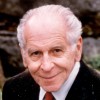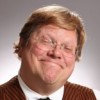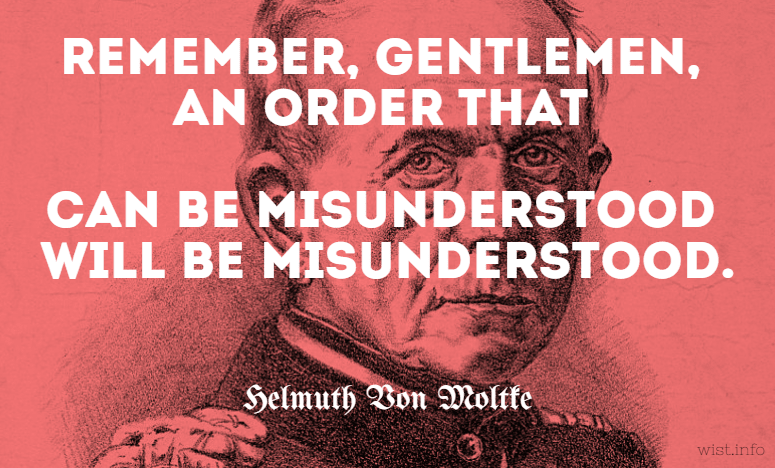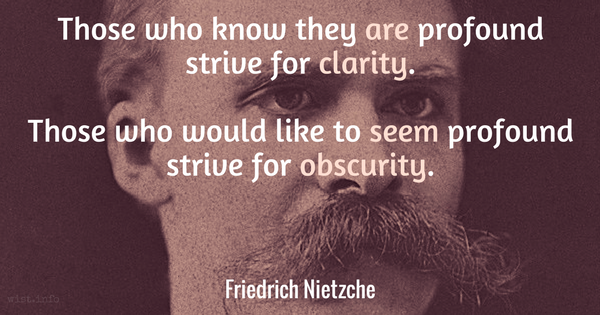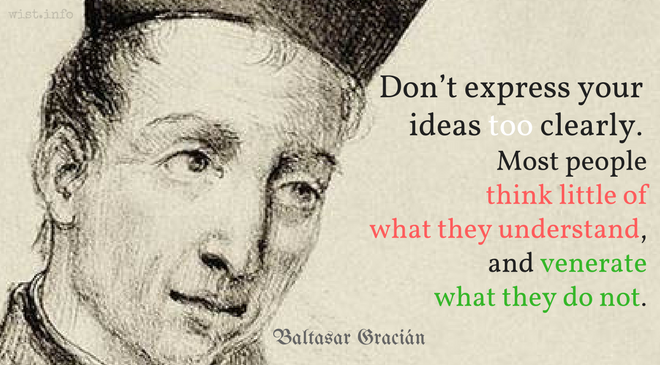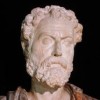But the ambiguities of metaphorical words, about which I am next to speak, demand no ordinary care and diligence. In the first place, we must beware of taking a figurative expression literally. For the saying of the apostle applies in this case too: “The letter killeth, but the spirit giveth life.”
[Sed verborum translatorum ambiguitates, de quibus deinceps loquendum est, non mediocrem curam industriamque desiderant. Nam in principio cavendum est ne figuratam locutionem ad litteram accipias. Et ad hoc enim pertinet quod ait Apostolus: Littera occidit, spiritus autem vivificat.]Augustine of Hippo (354-430) Christian church father, philosopher, saint [b. Aurelius Augustinus]
On Christian Doctrine [De Doctrina Christiana], Book 3, ch. 5 / § 9 (3.5.9) (AD 397) [tr. Shaw (1858)]
(Source)
Quoting 2 Cor. 3:6.
(Source (Latin)). Alternate translations:
But the ambiguities of figurative words, which are now to be treated, require no little care and industry. For at the outset you must be very careful lest you take figurative expressions literally. What the apostle says pertains to this problem: "For the letter killeth, but the spirit quickeneht."
[tr. Robertson (1958)]
But the ambiguities of metaphorical words, about which I must now speak, require no ordinary care and attention. To begin with, one must take care not to interpret a figurative expression literally. What the apostle says is relevant here: "the letter kills but the spirit gives life."
[tr. Green (1995)]
Quotations about:
clarity
Note not all quotations have been tagged, so Search may find additional quotes on this topic.
All ways of expressing ourselves are good if they make us understood. Thus, if the clarity of our thoughts comes through better in a play of words, then the wordplay is good.
Joseph Joubert (1754-1824) French moralist, philosopher, essayist, poet
Pensées [Thoughts], 1805 (1850 ed.) [tr. Auster (1983)]
(Source)
Analog not found in standard translations of the Pensees.
It’s through universal Misunderstanding that everybody comes to agreement.
If, by some misfortune, everybody understood each other, one could never come to agree.
[C’est par le malentendu universel que tout le monde s’accorde.
Car si, par malheur, on se comprenait, on ne pourrait jamais s’accorder.]Charles Baudelaire (1821-1867) French poet, essayist, art critic
Journaux Intimes [Intimate Journals], “Mon cœur mis à nu [My Heart Laid Bare],” § 99 (1864–1867; pub. 1887) [tr. Sieburth (2022)]
(Source)
(Source (French)). Alternate translations:
It is by universal misunderstanding that all agree.
For if, by ill luck, people understood each other, they would never agree.
[tr. Isherwood (1930)]
It is by universal misunderstanding that we agree with each other.
If, by some misfortune, we understood each other, we would never agree.
[Source]
The bitter, yet merciful, lesson which death teaches us is to distinguish the gold from the tinsel, the true values from the worthless chaff.
Felix Adler (1851-1933) German-American educator
Life and Destiny, Lecture 8 “Suffering and Consolation” (1903)
(Source)
Clean, quick, and easy as lying. We know how it ends practically before it starts. That’s why stories appeal to us. They give us the clarity and simplicity our real lives lack.
Patrick Rothfuss (b. 1973) American author
The Name of the Wind, ch. 45 “Interlude — Some Tavern Tale” [Kvothe] (2007)
(Source)
Dying is a troublesome business: there is pain to be suffered, and it wrings one’s heart; but death is a splendid thing — a warfare accomplished, a beginning all over again, a triumph. You can always see that in their faces. And come and close my eyes too, when I die; and see me as I really was.
George Bernard Shaw (1856-1950) British playwright and critic
Letter to Edith Lyttelton (5 Jul 1913)
(Source)
Sent on the death of her husband.
Clear thinking requires courage rather than intelligence.
Thomas Szasz (1920-2012) Hungarian-American psychiatrist, educator
The Untamed Tongue: A Dissenting Dictionary (1990)
(Source)
Unless one is raised in the minion mindset, it is difficult to understand the allure of the lifestyle. Outside observers merely see put-upon underlings who live and work in insanely dangerous positions, whose lives are ruled by dictatorial psychopaths who have little regard for their lives or sanity. Acclimatized minions realize that everyone on Earth lives under these strictures, they just don’t fool themselves. With clarity comes freedom.
Phil Foglio (b. 1956) American writer, cartoonist
Agatha H and the Voice of the Castle (2014) [with Kaja Foglio]
(Source)
Only a child sees things with perfect clarity, because it hasn’t developed all those filters which prevent us from seeing things that we don’t expect to see.
Clarity of language is the first casualty of authoritarianism.
Robin Morgan (b. 1941) American poet, author, activist, journalist
“Saving the World,” Ms. (Summer 2003)
(Source)
I made up my mind long ago to follow one cardinal rule in all my writing — to be clear. I have given up all thought of writing poetically or symbolically or experimentally, or in any of the other modes that might (if I were good enough) get me a Pulitzer prize. I would write merely clearly and in this way establish a warm relationship between myself and my readers, and the professional critics — Well, they can do whatever they wish.
Isaac Asimov (1920-1992) Russian-American author, polymath, biochemist
Nemesis, “Author’s Note” (1989)
(Source)
A set of beliefs is at once a way of seeing the world more clearly while, at the same time, foreclosing an alternative vision.
Lillian Rubin (1924-2014) American writer, professor, psychotherapist, sociologist
Intimate Strangers: Men and Women Together (1983)
(Source)
Section reprinted as "The Sexual Dilemma" in Roberta Satow, Gender and Social Life (2000).
Clarity and perseverance are difficult in American society because the basis of capitalism is greed and dissatisfaction.
Natalie Goldberg (b. 1948) American author, teacher, speaker
Wild Mind: Living the Writer’s Life, ch. 42 (1990)
(Source)
An intellectual is a man who says a simple thing in a difficult way; an artist is a man who says a difficult thing in a simple way.
A scrupulous writer, in every sentence that he writes, will ask himself at least four questions, thus: What am I trying to say? What words will express it? What image or idiom will make it clearer? Is this image fresh enough to have an effect? And he will probably ask himself two more: Could I put it more shortly? Have I said anything that is avoidably ugly?
But you are not obliged to go to all this trouble. You can shirk it by simply throwing your mind open and letting the ready-made phrases come crowding in. The will construct your sentences for you — even think your thoughts for you, to a certain extent — and at need they will perform the important service of partially concealing your meaning even from yourself.
It is at this point that the special connection between politics and the debasement of language becomes clear.
George Orwell (1903-1950) English writer [pseud. of Eric Arthur Blair]
“Politics and the English Language,” Horizon (Apr 1946)
(Source)
One can often be in doubt about the effect of a word or a phrase, and one needs rules that one can rely on when instinct fails. I think the following rules will cover most cases:
Never use a metaphor, simile, or other figure of speech which you are used to seeing in print.
Never use a long word where a short one will do.
If it is possible to cut a word out, always cut it out.
Never use the passive where you can use the active.
Never use a foreign phrase, a scientific word, or a jargon word if you can think of an everyday English equivalent.
Break any of these rules sooner than say anything outright barbarous.
George Orwell (1903-1950) English writer [pseud. of Eric Arthur Blair]
“Politics and the English Language,” Horizon (Apr 1946)
(Source)
Those who know they are profound strive for clarity. Those who would like to seem profound strive for obscurity. For the crowd believes that if it cannot see to the bottom of something it must be profound. It is timid and dislikes going into the water.
[Tief sein und tief scheinen. — Wer sich tief weiss, bemüht sich um Klarheit; wer der Menge tief scheinen möchte, bemüht sich um Dunkelheit. Denn die Menge hält Alles für tief, dessen Grund sie nicht sehen kann: sie ist so furchtsam und geht so ungern in’s Wasser.]
Friedrich Nietzsche (1844-1900) German philosopher and poet
The Gay Science [Die fröhliche Wissenschaft], Book 3, § 173 (1882) [tr. Kaufmann (1974)]
(Source)
Also known as La Gaya Scienza, The Joyful Wisdom, or The Joyous Science. (Source (German)). Alternate translations:
To Be Profound and to Appear Profound. -- He who knows that he is profound strives for clearness; he who would like to appear profound to the multitude strives for obscurity. The multitude thinks everything profound of which it cannot see the bottom; it is so timid and goes so unwillingly into the water.
[tr. Common (1911)]
Being Deep and Seeming Deep. -- Those who know they are deep strive for clarity. Those who would like to seem deep to the crowd strive for obscurity. For the crowd takes everything whose ground it cannot see to be deep; it is so timid and so reluctant to go into the water.
[tr. Nauckhoff (2001)]
Being Profound and Being Thought Profound -- Whoever knows that he is profound strives for clarity; whoever would like the crowd to think he is profound strives for obscurity. The reason for this is that the crowd thinks something is profound whenever it cannot see to the bottom of it; it is afraid of the water and hates to get its feet wet.
[tr. Hill (2018)]
Being Deep and Appearing Deep -- Whoever knows he is deep, strives for clarity; whoever would like to appear deep to the crowd, strives for obscurity. For the crowd considers anything deep if only it cannot see to the bottom: the crowd is so timid and afraid of going into the water.
[Source]
Whoever knows himself to be deep strives for clarity; whoever wants to appear deep to the masses strives for obscurity. For the masses consider anything to be deep that they cannot see the bottom of.
[Source]
Don’t express your ideas too clearly. Most people think little of what they understand, and venerate what they do not. […] Many praise without being able to say why. They venerate anything hidden or mysterious, and they praise it because they hear it praised.
[No allanarse sobrado en el concepto. Los más no estiman lo que entienden, lo que no perciben lo veneran. […] Alaban muchos lo que, preguntados, no saben dar razón. ¿Por qué? Todo lo recóndito veneran por misterio y lo celebran porque oyen celebrarlo.]
Baltasar Gracián y Morales (1601-1658) Spanish Jesuit priest, writer, philosopher
The Art of Worldly Wisdom [Oráculo Manual y Arte de Prudencia], § 253 (1647) [tr. Maurer (1992)]
(Source)
(Source (Spanish)). Alternate translations:
Not to be too intelligible. Most part do not esteem what they conceive, but admire what they understand not. [...] Many praise that which they can give no reason for, when it is asked them: because they reverence as a mystery all that is hard to be comprehended, and extoll it, by reason they hear it extolled.
[Flesher ed. (1685)]
Do not Explain overmuch. Most men do not esteem what they understand, and venerate what they do not see. [...] Many praise a thing without being able to tell why, if asked. The reason is that they venerate the unknown as a mystery, and praise it because they hear it praised.
[tr. Jacobs (1892)]
A Bit Vague. For most men have low regard for what they understand, and venerate only what is beyond them. [...] Many praise, but if asked can give no reason: Why? for they revere all that is hidden because mysterious, and they sing its praises, because they hear its praises being sung.
[tr. Fischer (1937)]
My anger has meant pain to me but it has also meant survival, and before I give it up I’m going to be sure that there is something at least as powerful to replace it on the road to clarity.
Audre Lorde (1934-1992) American writer, feminist, civil rights activist
“The Uses of Anger: Women Responding to Racism” (1981)
(Source)
It will be of little avail to the people, that the laws are made by men of their own choice, if the laws be so voluminous that they cannot be read, or so incoherent that they cannot be understood; if they be repealed or revised before they are promulgated, or undergo such incessant changes that no man, who knows what the law is today, can guess what it will be tomorrow.
Don’t write so you can be understood. Write so that you cannot be misunderstood.
Quintilian (39-90) Roman orator [Marcus Fabius Quintilianus]
De Institutione Oratoria, Book 8, ch. 2, l. 24
Alt. trans.: "We should not write so that it is possible for [the reader] to understand us, but so that it is impossible for him to misunderstand us."
Also attributed to Epictetus, Francis Bacon, Robert Louis Stevenson, Ralph Waldo Emerson, and William Taft.
Thy word is a lamp unto my feet, and a light unto my path.
The Bible (The Old Testament) (14th - 2nd C BC) Judeo-Christian sacred scripture [Tanakh, Hebrew Bible], incl. the Apocrypha (Deuterocanonicals)
Psalm 119:105 [KJV (1611)]
(Source)
Alternate translations:
Now your word is a lamp to my feet, a light on my path.
[JB (1966)]
Your word is a lamp to guide me
and a light for my path.
[GNT (1976)]
Your word is a lamp for my feet, a light on my path.
[NJB (1985)]
Your word is a lamp before my feet
and a light for my journey.
[CEB (2011)]
Your word is a lamp to my feet
and a light to my path.
[NRSV (2021 ed.)]
Your word is a lamp to my feet,
a light for my path.
[RJPS (2023 ed.)]
Speak properly, and in as few words as you can, but always plainly; for the End of Speech is not Ostentation, but to be understood.
William Penn (1644-1718) English writer, philosopher, politician, statesman
Some Fruits of Solitude, Part 2, “Of Conduct and Speech,” #122 (1682)
(Source)
There is no doubt that the “grail” of efficiency leads to abuse. Programmers waste enormous amounts of time thinking about, or worrying about, the speed of noncritical parts of their programs, and these attempts at efficiency actually have a strong negative impact when debugging and maintenance are considered. We should forget about small efficiencies, say about 97% of the time: premature optimization is the root of all evil.
Words, like glass, obscure when they do not aid vision.
[Les mots, comme les verres, obscurcissent tout ce qu’ils n’aident pas à mieux voir.]
Joseph Joubert (1754-1824) French moralist, philosopher, essayist, poet
Pensées [Thoughts], ch. 22 “Du Style [On Style],” ¶ 25 (1850 ed.) [tr. Lyttelton (1899), ch. 21, ¶ 15]
(Source)
(Source (French)). Alternate translations:
Words, like glass, darken whatever they do not help us to see.
[tr. Attwell (1896), ¶ 304]
Words, like eyeglasses, obscure everything they do not make clear.
[Source]
Depend upon it, Sir, when a man knows he is to be hanged in a fortnight, it concentrates his mind wonderfully.
Samuel Johnson (1709-1784) English writer, lexicographer, critic
Comment (19 Sep 1777)
(Source)
In James Boswell, The Life of Samuel Johnson (1791)








